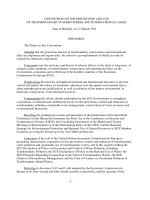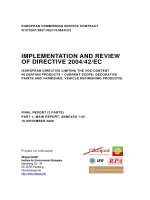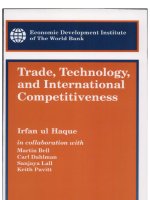- Trang chủ >>
- Khoa Học Tự Nhiên >>
- Vật lý
humanitarian intervention and international relations feb 2004
Bạn đang xem bản rút gọn của tài liệu. Xem và tải ngay bản đầy đủ của tài liệu tại đây (1.81 MB, 245 trang )
HUMANITARIAN INTERVENTION AND
INTERNATIONAL RELATIONS
This page intentionally left blank
Humanitarian
Intervention and
International
Relations
Edited by
Jennifer M. Welsh
1
1
Great Clarendon Street, Oxford OX2 6DP
Oxford University Press is a department of the University of Oxford.
It furthers the University’s objective of excellence in research, scholarship,
and education by publishing worldwide in
Oxford New York
Auckland Cape Town Dar es Salaam Hong Kong Karachi
Kuala Lumpur Madrid Melbourne Mexico City Nairobi
New Delhi Shanghai Taipei Toronto
With offices in
Argentina Austria Brazil Chile Czech Republic France Greece
Guatemala Hungary Italy Japan Poland Portugal Singapore
South Korea Switzerland Thailand Turkey Ukraine Vietnam
Oxford is a registered trade mark of Oxford University Press
in the UK and in certain other countries
Published in the United States
by Oxford University Press Inc., New York
© the several contributors 2004
The moral rights of the authors have been asserted
Database right Oxford University Press (maker)
First published 2004
First published in paperback 2006
All rights reserved. No part of this publication may be reproduced,
stored in a retrieval system, or transmitted, in any form or by any means,
without the prior permission in writing of Oxford University Press,
or as expressly permitted by law, or under terms agreed with the appropriate
reprographics rights organization. Enquiries concerning reproduction
outside the scope of the above should be sent to the Rights Department,
Oxford University Press, at the address above
You must not circulate this book in any other binding or cover
and you must impose the same condition on any acquirer
British Library Cataloguing in Publication Data
Data available
Library of Congress Cataloging in Publication Data
Data available
Typeset by Newgen Imaging Systems (P) Ltd., Chennai, India
Printed in Great Britain
on acid-free paper by
Biddles Ltd., King’s Lynn, Norfolk
ISBN 0–19–926721–9 978–0–19–926721–7
ISBN 0–19–929162–4 (Pbk.) 978–0–19–929162–5 (Pbk.)
13579108642
CONTENTS
Notes on Contributors vii
Preface to the Paperback Edition ix
Acknowledgements x
1. Introduction 1
Jennifer M. Welsh
PART ONE. INTERNATIONAL RELATIONS
THEORY AND HUMANITARIAN INTERVENTION
2. Limiting Sovereignty 11
Henry Shue
3. The Humanitarian Responsibilities of Sovereignty: Explaining
the Development of a New Norm of Military Intervention for
Humanitarian Purposes in International Society 29
Nicholas J. Wheeler
4. Taking Consequences Seriously: Objections to Humanitarian
Intervention 52
Jennifer M. Welsh
PART TWO. THE POLITICS AND PRACTICE
OF HUMANITARIAN INTERVENTION
5. The United Nations and Humanitarian Intervention 71
Sir Adam Roberts
6. Humanitarian Intervention in the Balkans 98
Nicholas Morris
7. Humanitarian Intervention and International Society: 120
Lessons from Africa
James Mayall
8. International Intervention in East Timor 142
Ian Martin
9. Humanitarian Intervention and Afghanistan 163
Simon Chesterman
10. Conclusion: The Evolution of Humanitarian Intervention in
International Society 176
Jennifer M. Welsh
Notes 189
Bibliography 211
Index 221
vi Contents
NOTES ON CONTRIBUTORS
Dr Simon Chesterman is Executive Director of the Institute for International
Law and Justice at New York University School of Law. He is the author of Just
War? Just Peace? Humanitarian Intervention and International Law (Oxford
University Press, 2001) and You, The People: The United Nations, Transitional
Administration and State-Building (Oxford University Press, 2004).
Ian Martin was Special Representative of the United Nations Secretary-General
for the East Timor Popular Consultation, May–November 1999, and head of
the UN Mission in East Timor (UNAMET).
Prof. James Mayall FBA is Professor of International Relations at Cambridge
University, and author of World Politics: Progress and its Limits (Polity Press,
2001). He is the author of several works on international relations theory,
editor of The New Interventionism 1991–1994: United Nations Experience in
Cambodia, Former Yugoslavia and Somalia (Cambridge University Press, 1996),
and co-editor, with Gene Lyons, of International Human Rights in the Twenty-
First Century: Protecting the Rights of Groups (Rowman and Littlefield, 2003).
Nicholas Morris is a former Inspector General of the UN High Commissioner
for Refugees and was the UNHCR’s Special Envoy in the former Yugoslavia in
1993–4 and 1998–9.
Sir Adam Roberts is the Montague Burton Professor of International Relations
at Oxford University, and a Fellow of Balliol College. He is co-editor, with
Benedict Kingsbury, of United Nations, Divided World: The UN’s Roles in
International Relations, rev. edition (Oxford University Press, 1993). He is the
author of several articles on international humanitarian law, and the co-editor,
with Richard Guelff, of Documents on the Laws of War, 3rd edn (Oxford
University Press, 2000).
Prof. Henry Shue is Professor of Politics and International Relations at the
University of Oxford and Senior Research Fellow in Philosophy at Merton
College, Oxford. Best known for Basic Rights (Princeton University Press, 2nd
edn, 1996/1980), he is currently writing primarily about ethical issues in the
conduct of contemporary warfare and about international justice as it arises
within international cooperation to slow climate change.
Dr Jennifer Welsh is University Lecturer in International Relations at Oxford
University, and a Fellow of Somerville College, Oxford. She is the author of
Edmund Burke and International Relations (Macmillan, 1995) and At Home in the
World: Canada’s Global Vision for the 21st Century (Harper Collins, 2004).
Nicholas J. Wheeler is Professor in the Department of International Politics at
the University of Wales, Aberystwyth. He is co-author of The British Origins of
Nuclear Strategy 1945–55 (Oxford: Oxford University Press), co-editor with
Tim Dunne of Human Rights in Global Politics (Cambridge: Cambridge University
Press, 2000) and author of Saving Strangers: Humanitarian Intervention in
International Society (Oxford: Oxford University Press, 2000). In recent years,
he has written widely on humanitarian intervention and the Blair govern-
ment’s ethical foreign policy. He is currently writing a book with Ken Booth
entitled The Security Dilemma: Fear, Cooperation, and Trust in World Politics (to
be published by Palgrave Macmillan in 2007). He has recently been made
Director of the David Davies Memorial Institute.
viii Notes on Contributors
PREFACE TO THE PAPERBACK EDITION
Since this book was completed in late 2003, a number of developments in both
the policy and academic worlds have sharpened and deepened the debate
about the legitimacy of humanitarian intervention in contemporary interna-
tional society. Indeed, while some predicted that the events of September 11,
2001 would ‘change everything’ about international relations—making issues
such as humanitarian intervention less relevant—the concerns raised by con-
tributors to this volume about sovereignty, the rule of law, the development
of new norms, and the relationship between powerful and weak states remain
as important as ever.
In this paperback edition, the original chapters appear largely unchanged,
except where new facts or more recently published works are essential to include.
However, I have included an updated and expanded Conclusion to the volume,
designed to take account of three issues in particular. First, the aftermath of
the war against Iraq in 2003 is examined in greater detail—especially the
attempt, post facto, to justify military action on humanitarian grounds. Second,
the Conclusion tracks the evolution of the concept of the ‘responsibility to
protect’, first enunciated by the 2001 International Commission on Intervention
and State Sovereignty and later endorsed in the UN’s 2005 Summit Outcome
Document. Finally, I discuss the on-going humanitarian crisis in the Darfur
region of Sudan, and assess why there has to date been very little effective
action against those perpetrating atrocities against civilians.
The book remains, at its core, an attempt to marry the theory and practice
of humanitarian intervention. I hope it continues to serve as a useful guide
for students, scholars, and policy-makers.
JMW
Oxford, U.K.
March 2006
ACKNOWLEDGEMENTS
The idea for this project on humanitarian intervention emerged during a con-
versation in an Oxford pub with two of my colleagues, David Williams and
Neil MacFarlane. I am grateful to both of them for helping me to see that the
most interesting issues surrounding humanitarian intervention are not ques-
tions of ‘right’, but rather the agonizing moral and political trade-offs that
states make in contemporary world politics.
Neil MacFarlane also supported me as co-chair in the seminar series from
which these chapters draw. True to form, his comments and questions in the
chair were sceptical and penetrating, and helped to put the process of paper
revision on the right track. I would also like to thank all those who acted as
discussants for the papers in their earlier renditions: Andrew Hurrell, Richard
Crampton, Sir Marrack Goulding, Timothy Garton Ash, Peter Carey, Richard
Caplan, Jane Boulden, and Michael Byers.
The Centre for International Studies and the Cyril Foster Fund generously
supported both the seminar series and edited book. Mark Philp, Department
Head for Politics and International Relations, encouraged my research and
facilitated some much-needed sabbatical leave.
In the book preparation phase, I relied heavily on the expertise, efficiency,
and good humour of my research assistant—and friend—Carolin Thielking.
Her knowledge of the broad subject area of human rights and humanitarian
intervention proved invaluable to the overall project, and particularly to my
own chapter.
I must also thank the Politics Editor at Oxford University Press, Dominic
Byatt, who was enthusiastic from the outset and nudged me very gently toward
completion. Desmond King, of Nuffield College, was a quiet supporter in the
background and no doubt helped to forge my new relationship with OUP.
Finally, I express my gratitude to all those in the Oxford community who,
in one form or another, have supported me in my work over the past four
years. Aside from those I list above, I would like to single out Anne Deighton,
Rosemary Foot, Eddie Keene, Kalypso Nicolaidis, Avi Shlaim, and Ngaire
Woods. Special thanks go to my PPE colleagues at Somerville College, who
have done so much to make me feel welcome in my new home: Lesley Brown,
Judith Heyer, James Logue, and most of all Lois McNay.
Oxford
March 2003
1
Introduction
Jennifer M. Welsh
The issue of humanitarian intervention has generated one of the most heated
discussions in international relations over the past decade—among both
theorists and practitioners. At the heart of the debate is the alleged tension
between the principle of state sovereignty, a defining pillar of the United
Nations (UN) system and international law, and the evolving international
norms related to human rights and the use of force.
This edited collection investigates the controversial place of humanitarian
intervention in international society through the lenses of theory and practice.
Although the subject has gained greater prominence, it continues to have an
uneasy relationship with both the major schools of thought in the discipline
of IR, and the behaviour of states, international organizations, and non-
governmental actors.
1
Many academic discussions focus on the question of
whether there is a legal right of humanitarian intervention,
2
giving insuffi-
cient attention to the underlying ethical issues, the politics within inter-
national organizations and coalitions, and the practical dilemmas faced by
international actors—before, during, and after intervention.
The book is the culmination of a series of seminars that were held at the
University of Oxford in October–December 2001, and reflects subsequent
revisions by and discussion among the contributing authors. It includes chap-
ters by well-known academics from the disciplines of law, philosophy, and
international relations, as well as those who have been actively engaged in
instances of intervention during the past decade. The cases covered include
those which took place in the early years of the post cold war period, such as
Somalia and Bosnia, as well as the intervention in 2001 to root out terrorists
in Afghanistan. Indeed, as our series began, the world was still reeling from
the horrific terrorist attacks on New York and Washington and preparing for
the military campaign against the Taliban. The final product here analyses
how the issue of humanitarian intervention is evolving in a post-11
September world.
Three main themes unify the book. The first is the expansion of inter-
vention. While very few interventions for humanitarian purposes occurred
during the cold war, the 1990s witnessed a series of military actions explicitly
supported by humanitarian rationale. In these cases, the apparent conflict
between sovereignty and human rights has been addressed in two ways: through
an evolution in the notion of sovereignty, from ‘sovereignty as authority’
(control over territory) to ‘sovereignty as responsibility’ (respect for a minimum
standard of human rights); and through an expanded definition of what con-
stitutes a ‘threat to international peace and security’ under chapter VII of the
United Nations Charter. As a result of the first move, massive violations of
human rights inside the domestic jurisdiction of a state have been transformed
into a matter of international concern; as a result of the second, the UN can
legitimately authorize international action to address security threats that
emerge from humanitarian crises.
Several features of contemporary international relations provide added
impetus to those calling for more interventionism: the weakness (or complete
failure) of state structures in many conflict-ridden societies, which provides
opportunity for criminal activity, arms proliferation, and terrorism; the increased
vulnerability of civilians in the context of civil conflict, and the intensification
of refugee flows; the ‘CNN effect’, in which global and instantaneous access to
information heightens popular awareness of human suffering; the strengthen-
ing of human rights norms and proliferation of human rights organizations;
the strengthening of international institutions, regional and global, which
increases the possibility of states acting on a multilateral basis; and the search
by Western governments for new forms of political legitimacy and ‘moral
authority’ to replace the ideologically driven agenda of the cold war. In short,
today’s debate about the legitimacy of intervention is being conducted in a
climate of heightened expectations for action.
Second, despite this new climate of permissiveness, humanitarian interven-
tion remains a controversial norm in international relations—largely because of
continued opposition from certain members of international society, and con-
cerns about its potentially negative consequences. These consequences include
the impact on the norms of territorial integrity and non-intervention, the cre-
ation of unrealistic expectations on the part of oppressed peoples, the negative
side effects arising from the use of force, and the potential for long-term ‘occu-
pation’ by the intervening power. The ambiguous status of the norm is reflected
in the cases examined in this book, and the varying degrees to which they
conform to a ‘classic’ understanding of humanitarian intervention.
The third theme is that humanitarian interventions are plagued by prob-
lems of will and capacity. While the 1990s saw some successful cases of inter-
vention to address humanitarian catastrophes (such as East Timor), the current
capability of regional and international organizations to undertake human-
itarian interventions remains limited. In fact, as the book demonstrates, the
issue of humanitarian intervention has the potential to divide international
institutions such as the UN and damage their credibility. This is powerfully
illustrated by the failure to generate consensus on a stronger response to the
2 Introduction
humanitarian crisis in the Darfur region of Sudan during the latter part of
2004. Humanitarian intervention has also posed new challenges for humani-
tarian organizations, whose neutrality has been compromised in cases such as
Kosovo and Afghanistan. This mixed record of success has, in turn, led to cau-
tion on the part of international actors about engaging in military action for
humanitarian purposes. As a result, humanitarian intervention is likely to
remain an exceptional practice in international society in the coming decades.
1.1 The terms of debate
One of the greatest analytical challenges posed by humanitarian intervention
is the variation in how it is defined. Indeed, the field of the analyst (law,
ethics, or politics) can often influence the definition that is chosen. The most
contentious areas of debate are whether humanitarian intervention is limited
to instances where there is an absence of consent from the host state; whether
humanitarian intervention is limited to punishment actions—as opposed to
actions designed to facilitate the delivery of humanitarian assistance; and
whether humanitarian intervention is limited to instances where there has
been explicit Security Council authorization for action.
From the standpoint of international law, narrowing the discussion of
humanitarian intervention has proven essential to establishing the status
of the ‘right’.
3
For our purposes, however, it is important to consider the range
of actions and cases that have been motivated by humanitarian concerns,
even if some do not fully respect the legal definition of humanitarian inter-
vention. What the cases from the 1990s demonstrate is that the legal require-
ment of ‘non-consent’ is in practice very difficult to maintain—particularly
when consent is ambiguous or coerced. Consequently, our definition will
encompass certain interventions for humanitarian purposes that had, at least
for some part of their duration, a degree of consent from the host state’s gov-
ernment, if not necessarily from all parties and factions. On the other hand,
while the term ‘humanitarian intervention’ has sometimes been used, espe-
cially by relief agencies, to refer to any major humanitarian action in an emer-
gency situation, our definition will restrict its meaning to cases where
military force is involved. Finally, on the question of authorization, this vol-
ume will look at both UN-sanctioned and so-called unilateral humanitarian
interventions. Though the latter type has driven much of the controversy over
humanitarian intervention,
4
we believe there are important theoretical and
practical issues associated with those military actions that received Security
Council endorsement.
In subsequent chapters, the following definition of humanitarian
intervention will be used: coercive interference in the internal affairs of a state,
involving the use of armed force, with the purposes of addressing massive human
rights violations or preventing widespread human suffering.
Introduction 3
1.2 IR theory and humanitarian intervention
A variety of normative IR theorists have addressed the ethical dilemmas related
to humanitarian intervention. Part One engages this literature, but also pene-
trates more deeply into how the various schools of thought in IR (particularly
realism, constructivism, and international society) treat the issue of humanitar-
ian intervention, and whether/how recent practice supports these approaches.
In Chapter 2, Henry Shue presents a passionate case for limiting the notion
of sovereignty, drawing on both philosophical and historical arguments. His
position rests on understanding how rights necessarily imply duties. For Shue,
sovereignty is limited because the duties that are constitutive of the right—
and without which there can be no right—constrain the activity of every sov-
ereign belonging to international society. From this foundation, he
demonstrates that one surprising limit on state sovereignty is dictated by the
nature of fundamental individual rights.
Chapter 3, by Nicholas Wheeler, confronts two central issues in contem-
porary IR theory: the relationship between power and norms in international
society, and changing conceptions of sovereignty since the end of the cold
war. After demonstrating how norms constrain the behaviour of states, he
goes on to assess the status of the norm of ‘sovereignty as responsibility’.
Wheeler argues that this norm has taken firm root in international society—
evidenced by the language that states have used to justify humanitarian inter-
vention. Nonetheless, he concludes that states are unlikely to translate the
norm into codified criteria for a legitimate humanitarian intervention.
In Chapter 4, I evaluate the legal and ethical objections to humanitarian
intervention, and argue that those focused on the consequences for inter-
national order are the most compelling. In so doing, I pay particular attention
to the arguments of non-Western states and their concerns about ‘neo-
imperialism’. I conclude by supporting Shue’s and Wheeler’s contention that
despite powerful objections, humanitarian intervention can be legitimized in
extreme cases.
1.3 The politics and practice of humanitarian
intervention
Part Two of the book looks at the practice of humanitarian intervention, first
with respect to the UN system, and then through a series of examples from
the last decade. A series of issues emerge from the case treatment.
1.3.1 Ends and rationale for action
First the cases illustrate the two main ‘routes’ to humanitarian intervention
that have been taken since the end of the cold war: one through international
4 Introduction
human rights and the other through expanded notions of security. But they
also demonstrate that, contrary to conventional wisdom, the conflict
between sovereignty and individual rights is not clear-cut. As Nicholas Morris
notes in Chapter 6, the Bosnian regime did consent to the original placement
of UN forces, although they were designed for impartial peacekeeping.
Similarly, as Ian Martin’s discussion of East Timor shows, the Habibie govern-
ment’s consent was taken as a necessary condition before an international
mission could proceed. Moreover, most instances of intervention in the post-
cold war period have involved chapter VII Security Council resolutions that
refer to the transborder effects of humanitarian crises. This suggests that states
remain reluctant to assert that a human rights violation by a government
against its own people is, in itself, a sufficient justification for the use of force.
The examples in this book also indicate that the rationale for intervention
can shift during the course of military action. This was particularly evident in
Somalia and Kosovo, where unanticipated consequences led the intervening
states to change the objectives of the military mission—even to the point
of obtaining additional Security Council resolutions. It was also apparent in
the debate over the legitimacy of war against Saddam Hussein’s regime in the
spring and summer of 2003, as arguments about weapons of mass destruction
increasingly gave way to justifications based upon the human rights of the
Iraqi people. Such changes in ends and rationale pose challenges for inter-
vening states in operational terms, but also require complex strategies for
communicating with their domestic constituencies.
1.3.2 The politics of intervening
Understanding the political motivations behind humanitarian intervention is
another important objective of this book. In some instances, key regional
powers have taken the lead in lobbying the Security Council for action, as
Australia did in the case of East Timor. In other situations, most notably
Kosovo, humanitarian organizations such as UNHCR have performed a cru-
cial role in providing evidence for Security Council discussions—leading
some to question their independence and impartiality.
5
In at least two of the
cases, East Timor and Somalia, strong domestic pressure and media attention
played a critical part in convincing Western governments to act. As James
Mayall describes in Chapter 7, all of these catalysts for action were absent in
the biggest case of ‘non-intervention’ in the 1990s: Rwanda in 1994. Many of
the book’s contributors highlight this problem of selectivity in humanitarian
intervention, and how it damages the credibility not only of the UN, but also
of Western states.
The cases also demonstrate that limited capacity—in terms of personnel,
finances, and political commitment—affects the likelihood and shape of
interventions. This issue has become even more problematic as several of the
Introduction 5
interventions evolve into sustained peace-building efforts. The long-term
presence of security forces, as well as the significant commitment of civilian
expertise, have led some in the West to conclude that a non-interventionist
posture is the right one.
Finally, 11 September and its aftermath has had a significant impact on the
politics of humanitarian intervention. Afghanistan prior to 11 September could
be regarded as another case of ‘non-intervention’; despite the significant abuses
of human rights (particularly the rights of women), the punitive measures taken
by the West were confined to sanctions. The terrorist attacks on New York and
Washington, however, changed the equation. As Simon Chesterman argues,
while the bombing campaign was an act of self-defence—not a humanitarian
intervention—it also sparked debate as to whether preventative actions should
be taken to address the root causes of terrorism. Above all, the situation in
Afghanistan demonstrated that state failure might have consequences wider
than poverty and lawlessness for a state’s own population. Addressing those
consequences may, in the future, require a combined strategy of military action
and civilian reconstruction.
1.3.3 Authorization
The question of who should, or who can, engage in humanitarian interven-
tion has gained greater prominence in the aftermath of the NATO-led action
in Kosovo. While international law on the use of force sanctions unilateral
action for the purposes of self-defence, Security Council authorization
(as outlined in Article 24 of the Charter) is legally required for other kinds of
military action. Ad hoc ‘coalitions of the willing’, acting without UN endorse-
ment, have dubious legal status. Furthermore, such efforts threaten to erode
an important source of legitimacy in international society.
Nonetheless, as Adam Roberts shows in Chapter 5, the practice of inter-
vention suggests that complete reliance on the Security Council could prove
problematic for moral and practical reasons. First, as Kosovo illustrates, claims
of illegality do not necessarily absolve those who have the power to act from
their moral responsibilities. Second, today’s UN is not yet a world government
and has only rudimentary competence (legally and practically) to intervene
in domestic crises. Indeed, the Security Council still lacks any clear set of cri-
teria for deciding on humanitarian intervention—despite several attempts to
try to develop them. Third, while one of the original purposes of the Security
Council was to act as a guardian for international order, the behaviour of indi-
vidual members of the Council is not always encouraging. This problem is
exacerbated by the fact that the Security Council is viewed by some states
as unrepresentative and a poor proxy for ‘international will’. Finally, as
James Mayall suggests in his Chapter, policymakers need to confront the
possibility that unilateral action can be more timely and effective, especially
6 Introduction
if undertaken by regional powers with the right mix of knowledge and
capability.
1.3.4 Consequences
The legitimacy of an intervention is often judged with reference to its conse-
quences rather than its intentions. In short, there is nothing like success to
silence one’s critics. The cases reviewed in this book present a mixed story,
leading the contributors toward some interesting conclusions. Nicholas
Morris, for example, argues that a response whose primary purpose is to
relieve human suffering may not be sustainable in conflicts involving serious
violations of human rights: It will lose legitimacy the longer it continues
without effective action to prevent suffering. Loss of legitimacy is likely to be
most marked in situations where the creation of such suffering is a war aim,
as it was in the Balkans, rather than a consequence of conflict. If the will for
coercive military threats or action exists, Morris argues, a humanitarian inter-
vention should have prevention and an end to the causes of suffering as
its primary purpose. Civilian humanitarian relief may even need to be
suspended during such an intervention. Otherwise, he suggests, the day-
to-day activities of organizations such as UNHCR will be hampered by the
international community’s ambiguous intentions.
This book also addresses longer-term consequences. One of the notable
features of humanitarian interventions in the post cold war era is the contin-
ued presence of international forces and administrators once the immediate
crisis is over. As I suggest in Chapter 4, the real conflict between the impera-
tive to intervene and the norm of state sovereignty comes not at the moment
of coercive action, but rather in the aftermath, when the international commu-
nity takes the target state into trusteeship. A recurring theme of our seminar
series was that humanitarian interventions contain within them imperialist
implications. A sustained international presence, while crucial to creating
lasting stability, raises thorny questions not only about self-determination,
but also about the accountability of Western-sponsored transitional authorities.
If empire really is back, then decisions about whether to intervene in human-
itarian crises will need to incorporate solutions to these new challenges.
Introduction 7
This page intentionally left blank
PART ONE
International Relations Theory and
Humanitarian Intervention
This page intentionally left blank
2
Limiting Sovereignty
Henry Shue
2.1 Introduction
This chapter defends the thesis that if limits on how states may treat their
own residents on their own territory are to be effective, states must also be
limited, in specific ways, concerning which ill-treatment of residents within
the territories of other states they are free to ignore. This relatively contro-
versial burden on the external sovereignty of states follows, I will suggest,
from a relatively uncontroversial feature of individual rights.
For discussions of military intervention, the sovereign state is still the
salient unit, in spite of the fact that states are by no means the only import-
ant agents in international affairs.
1
The sovereign state is a historically recent
and contingent form of human organization, invented in modern Europe and
largely imposed by Europeans upon the remainder of the modern world;
other civilizations have been organized in other ways, and even in the West
sovereignty has served other purposes from the purposes it serves now
(see Reus-Smit 1999). But contemporary sovereign states constitute a single,
now-universal system. The good news, from my point of view, is that in
principle the purposes of states, and the extent of their sovereignty, could be
reformulated; other options are not simply conceivable but have actually
functioned for long periods. The bad news is that, in fact, the current system
has immense inertia and is supported by entrenched interests, many of
which, including the attachments of individual persons I shall discuss in the
final section of the chapter, it has itself deeply shaped. Still, it does not seem
completely quixotic to articulate the moral case for partially modifying our
understanding of the prerogatives of states; and the moral case is, I shall try
The original draft of this chapter was a paper entitled ‘Conditional Sovereignty’ written for the
Working Group on Armed Intervention, convened by the Centre for Philosophy and Public Issues,
University of Melbourne. I am grateful to Professor C. A. J. Coady for the invitation to participate and
to both Tony Coady and Bruce Langtry for valuable suggestions regarding the original draft, as well
as to Jennifer Welsh for her civilizing influence on the more unruly tendencies of the final draft.
to show, ready to be articulated. Consider, first, a prominent political
theorist’s warning against (what he thinks is) moralism.
2.2 Sovereignty as a right to do wrong
Writing about sovereignty and intervention with his customary provocative-
ness, Friedrich Kratochwil has remarked:
One of the most important implications of conceptualizing sovereignty as an
analogon to dominium is that the exercise of this right is no longer easily defeas-
ible by moral considerations of right and wrong . . . Having a ‘right’ conceived
along the lines of Roman property rights simply entitled the holder of that right
to ‘do the wrong thing’ as long as he was within his territorially limited
domain . . . Although moral considerations are not irrelevant to an appraisal [of
actions possibly targeted for intervention], the relevance of such considerations is
clearly bounded by the institutional constraints imposed by the notion of an
exclusive right [emphasis in original] (Kratochwil 1995: 26, 33).
I take the gist of Kratochwil’s thesis—credited by him to Grotius—to be that
sovereignty is the kind of right that creates a space within which the bearer
of the right is sometimes [my emphasis] free to do what is morally wrong. This
seems correct and important, yet misleading if overemphasized. In the case of
individual persons it is a well-known, although not entirely uncontroversial,
position that a right to liberty includes being guaranteed liberty, for example,
to be unkind to animals, insulting to colleagues, and unfaithful to friends,
even in circumstances in which all these actions are clearly morally wrong.
It is never right to do wrong, but one has a right to do it, sometimes.
2
While the exercise of sovereignty is certainly not ‘easily defeasible’ by direct
appeals to morality, the proper scope of sovereignty’s exercise does change;
and it could change partly in response to moral appeals. Kratochwil is correct
to imply that the change may require two steps: one cannot merely say, ‘this
is wrong, so sovereigns are not allowed to do it’, since sovereigns are under-
stood to be free to do much that is wrong (as are individual persons). But one
can say, (1) this (e.g. the extirpation of minorities) is so very wrong that even
sovereigns should be understood in future not to be free to get away with it;
and (2) once this is generally understood among sovereigns to be outside the
scope of sovereignty, sovereigns ought not, according to the now-tightened
rules of sovereignty, to do it in future. In other words, this action has now been
removed from the list of wrongs that even they are free to commit.
A rule change may have to precede, in order to be the basis for, a demand
for a behaviour change, but there is no reason why the rule change cannot be
based, at least in part, on moral considerations.
3
Morality can require a
change in the specification of a role, and the change in the specification of
the role can then require a change in behaviour. The moral considerations
influence behaviour indirectly by way of their effect on the role. Morality’s
12 International Relations Theory
work is indirect but not irrelevant. This does not contradict anything
Kratochwil says, but it reverses what I take to be his emphases.
2.3 Sovereignty as limited
The content of sovereignty blinds us to its form, but its form imposes unseen
limits on its content. I will begin by trying to explain, justify, and spell out
practical implications of the obscure thesis just stated.
According to some heads of state, sovereignty is about each state’s doing
entirely as its current government pleases, at least within what it itself defines
as its own territory. In their view, not only may the state sometimes do wrong,
it may decide for itself what wrong it may do, without restriction. Yet not
even the patron saints of this (distinctly Western) doctrine formulated it in
such unqualified terms, even in its ‘absolutist’ forms. Moreover, attempts to
state a doctrine of sovereignty without limits turn out to be quite literally
incoherent. I shall look briefly at these two separate kinds of grounds, historical
and conceptual, for judging that sovereignty was not originally intended to
be, and indeed cannot be, unlimited, before turning at somewhat greater
length to an exploration of one surprising kind of limit that minimal morality
requires of it.
If we examine some of the classical theorists, we see that aspirations to
sovereignty and non-intervention are tempered by considerations above and
beyond the state. Hedley Bull, commenting on the approach of Christian
Wolff, noted:
The reasons why collective intervention is preferable to unilateral take us back to
the contention of Christian Wolff that intervention is acceptable when it is carried
out by the civitas maxima. Ultimately, we have a rule of non-intervention because
unilateral intervention threatens the harmony and concord of the society of
sovereign states. If, however, an intervention itself expresses the collective will of
the society of states, it may be carried out without bringing that harmony and
concord into jeopardy.
4
Nicholas Onuf finds the same recognition of limits in the writings of the
Dutch international lawyer, Emmerich de Vattel:
Nonintervention is Vattel’s second general law. ‘The first general law, which is to
be found in the very end of the society of nations, is that each Nation should
contribute as far as it can to the happiness and advancement of other Nations.’ By
implication, Vattel’s first general law expresses a positive duty of mutual aid,
limited only by duties to one’s own people, and not by the possibility that such
assistance may be construed as intervention (Onuf 1995: 43).
Thus, even for Wolff and Vattel, whose theoretical objective was to establish
sovereign states as moral and legal entities, sovereignty was by no means a
matter of each state’s having some indefeasible and total discretion. In short,
Limiting Sovereignty 13
it is not unheard of—and, to the contrary, was the original idea—that
sovereignty has limits.
Consider an even more abstract point, which has significant practical
implications. In his imposing study John Vincent emphasized ‘the function
of the non-intervention principle as protector of state sovereignty’
(Vincent 1974: 15). The connection was explained as follows:
If a state has a right to sovereignty, this implies that other states have a duty to
respect that right by, among other things, refraining from intervention in its
domestic affairs . . . The function of the principle of nonintervention in inter-
national relations might be said, then, to be one of protecting the principle of
state sovereignty (Vincent 1974: 14).
Vincent was utterly correct: non-intervention does protect sovereignty.
However, the story contains more twists than this part of it alone might
suggest.
The principle of non-intervention protects the principle of sovereignty, but
at the same time the principle of non-intervention limits the principle of
sovereignty. In an imaginative recent work that valuably integrates empirical
and conceptual considerations, Oliver Ramsbotham and Tom Woodhouse
first portray the external sovereignty of any one state being limited by the
internal sovereignty of every other state:
The non-intervention norm . . . is often described as the other side of the coin of
sovereignty. This is somewhat misleading, as can be seen by comparing the right
to wage war, long regarded as constitutive of sovereignty (its outward manifesta-
tion) with the principle of non-intervention, also seen as constitutive of
sovereignty, only this time a manifestation of its inner integrity . . . The non-
intervention norm is in this sense a constraint on sovereignty [emphasis in original]
(1996: 34–5).
Ramsbotham and Woodhouse go on to suggest that the norm of non-inter-
vention that protects the internal sovereignty of one state by limiting the
external sovereignty of all other states has a fundamentally different charac-
ter from the norm of [external] sovereignty that it constrains. ‘The essential
point’, they write, ‘is that whereas the right to wage war inheres in each state
individually within the international anarchy, the non-intervention norm is
constitutive of the collectivity of the international society of states’ [emphasis in
original].
5
The difficulty is that the suggestion of a right within an anarchy is
incoherent. Rights rest upon limiting rules, and where rules function, there
is less than full anarchy. States might wage war within a genuine anarchy, but
if states enjoy a right to do anything, including a right to wage war, they are in
a partially rule-governed situation, not a complete anarchy.
The fundamental point is not, as Ramsbotham and Woodhouse have it,
that there is a putative difference between sovereignty and non-intervention,
or between external and internal sovereignty, but quite simply a point about
14 International Relations Theory









